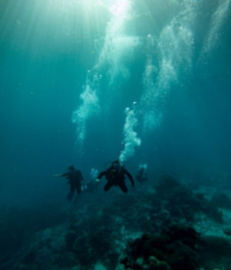
The Department of Employment and Labour has told commercial divers that economic costs of poor occupational health and safety practices in the form of medical and rehabilitation costs, as well as loss of income, affects both the employer and the employee.
Speaking during a commercial diving workshop in Gqeberha on Tuesday, Senior Specialist: Occupational Health and Hygiene, Bulelwa Huna said the International Labour Organization (ILO) estimates that 4% of the world's Gross Domestic Product (GDP) is lost due to accidents and work-related diseases.
“It has been established that the economic costs of poor occupational health and safety practices affects both the employer and the employee. This is as a result of employers' medical and rehabilitation costs plus the employee's loss of income," Huna said.
Huna told the workshop that the department has never accepted the proposition that injury and disease 'go with the job'.
She stressed the importance of occupational health and safety. “All social partners have to work together to promote and ensure this fundamental right," she said.
The workshops follow the promulgation of the new commercial diving regulations on May 20, this year.
The workshop dealt with the application of the Occupational Health and Safety legislation in the commercial diving industry, the training standards for commercial divers as well as logistical processes.
Huna reiterated the core values of occupational health and safety as adopted by the ILO.
“The core values as reflected in ILO standards on occupational safety and health are expressed in three main principles being that the diving activities should take place in a safe and healthy working environment.
Conditions
“Conditions of commercial diving activities should be consistent with divers and workers' wellbeing and human dignity; and work and commercial diving activities should offer real possibilities for personal achievement, self-fulfillment and service to society,” she said.
According to the new regulations, for someone to be trained as a commercial diver, the training provider must consider the individual's abilities and course requirements.
Specialist: Occupation Health and Hygiene, Jabulile Mhlophe, told the gathering that for one to be trained as a commercial diver, an individual must have attributes of a diver.
“That is, physically capable, capable of rational thoughts during execution of underwater tasks, competent to dive through experience and familiarity of equipment and technique, and capable to safely plan and execute a commercial dive for the certification class trained for,” Mhlophe said.
She told the gathering that in addition to the personal attributes, an individual must pass theoretical as well as practical assessments.
Mhlophe also took the workshop through the process of license registration for commercial diving contractors, organisations, commercial diving schools as well as individual divers.
The workshop was also taken through several new regulations which deal with the responsibilities as well as logistical requirements in diving operations.
The next commercial diving workshop will be held today at the University of Cape Town (John Day LT2 in the John Day Building, University Ave North, UCT, Upper Campus, Rondebosch) in the Western Cape.
Additionally, a workshop will be held on 18 July at uShaka Marine in Durban, at the South African Association for Marine Biological Research (SAAMBR). –SAnews.gov.za


